Abstract
Nowadays event marketing, following through interaction between consumers and a product, shows a significant increase of promotion campaigns effectiveness of different levels. While planning an event, in addition to technical issues it is required to pay attention to individual and communicative peculiarities of consumers` involvement. As a result of the conducted research, specificities of males` and females` marketing events perception are received. Gender disparities include a complex of cultural (social) and individual (behavioural, speech) peculiarities of humans, they form a specific way of thinking and behaviour, facilitate a desirable presentation of themselves and play a role in a group interaction. The survey data demonstrated that females, who visit events, search for an exciting involving life, interesting people and useful contacts with others mainly in the closed spaces. Cross-tabulation analysis, used in the paper, reveals features of events perception. The process itself should include moments of interaction with a promoted product, signature interior design. The male audience makes a preference on verbal communication, marking a substantive message and personal benefits. Men don’t perceive corporate colours as marketing incentives however “pre-event support” is highly efficient, therefore reminders of the coming event and mentioning the event’s benefits are desired. Making a product presentation for males, it is essential to suggest rational solutions for their lives and avoid excessive emotions. Male representatives prefer open “live” spaces and areas to stay with a group of people and save their individual independence at the same time.
Keywords: Event marketing, events perception, gender
Introduction
Event marketing is gaining popularity as the way of promotion preferred by marketers. The Russian word ‘sobytie’ (which means ‘event’ in English) consists of the root word ‘bytie’ (translated as ‘life’ into English) and the prefix ‘co-’ (corresponding to the English prefix ‘co-’) which implies involvement in a common objective. Thus, the Russian equivalent for the word ‘event’ means a set of points that goes with an individual throughout his life, determines his belonging to something global; it unites people fosters their successful socialization. Effective use of the event as an element in promotion ensures linkages between the consumer and the product at the daily level because then the product closely fits into consumes’ life, coexists with them. Moreover, various events bring all the audience together. That improves the overall effectiveness of communication due to reinforcement and approval of the displayed behaviour by the associates (also participants in the events).
The worldwide pandemic ‘Covid-19’ has amended the process of the event marketing development: the market has considerably slowed down its rate of growth and is suffering losses. Industry experts forecast that the event marketing in Russia is going to suffer around 110 billion rubles loss which represents 70% of the market size. However, experts have come to the conclusion that despite the volatile situation in the field of the event marketing, the market will actively try to transform and continue to be relevant in the future. World affairs of 2020 have furthered the process of market restructuring: new types of events at the junction of gamification, theatricalization and film production have appeared.
The modern event marketing is taking the following forms:
- ‘Corporative Events’ (events aimed at work with the company staff; e.g. office parties, sporting events, team-building);
- ‘Trade Events’ (events the aim of which is promoting solutions, meetings, products; e.g. summits, conferences);
- ‘Special Events’ (on the whole they are entertaining events designed to amuse large groups of people; e.g. workshops, festivals, shock-promotion).
In the ordinary sense, the term ‘event marketing’ is used by marketers as one of the ways to promote a certain product. But it can be applied to the management of regions as well (Golub et al., 2018; Lomovtseva & Maslova, 2013). In this regard, the use of promotion tool is considered as a possibility of improving the quality of life within the region by meeting its needs and revealing its competitive capabilities (Prokhorov, 2018). In his work, Dyachenko (2013) emphasized the process of ‘theatricalization of hospitality’ – the phenomenon of organizing advancing of regions as a specific product; Novichkov (2011), Dolgova (2018) and others are also focused on the hospitality marketing. Achievement of the goals of marketing of the regions is determined by the struggle for financial, scientific-technical and human resources (Khavanova et al., 2014). Mechanism for advancing with the help of the event marketing takes place through attracting audiences’ attention to certain areas by means of arranging scaled events (Klimova & Vishnevskaya, 2014; Warren et al., 2018).
Problem Statement
The event is, first of all, interaction social in nature. There can be the following types of events: ‘man-man,’ ‘man-group,’ group-group.’ For this reason, in addition to technical perspectives of organizing the event, it is necessary to pay particular attention to the study on how an individual perceives the event, which personal or group-based attributes influence his opinion on the event and, eventually, on the promoted product. In this work, the authors have shown the aspect of perception of marketing events by the audiences considering their gender specificities. Attention to gender differences is based upon the fact that it is a combination of cultural (social) and individual (speech, behavioural, etc.) characteristics. They form a certain way of thinking and pattern of behaviour, encourage an individual to convey the desired information about themselves to others and help to solve the issues of interaction with society. Denoting gender based on biological characteristics of male and female is not always true for a variety of reasons including cases when a combination of masculine and feminine features can be captured in one person. Nevertheless, numerous studies (Ekimova & Filippova, 2008; Gabdreeva, 2016; Nistratov & Sinyachkin, 2014; Pologikh, 2016, etc.) have proven that there is fundamental difference in the way men and women communicate with others. Communicative activity of men is aimed at rapid implementation of their objectives through logical and cohesive interaction. For men, independence is more preferable while women appreciate intimacy. In a man's conversation, peculiarities of his upbringing are manifested. Expressions like ‘Man will not cry,’ ‘Don’t act like a girl’ are the examples of statements that often accompany the process of growing up a boy-child (adolescent). The boy is brought up as a strong and independent person, a defender having no vices. These particular features of gender education affect communicative activity of the man which is reflected in trying to avoid manifestation of excessive emotions, refusing to accept failure, wishing either to solve the problem in a rational way or escape it.
Describing female gender, the following points can be emphasized:
- women perceive verbal part of information more effectively; they are characterized by quick perception of the object of communication, though of lower quality;
- women are characterized by quick but lower-quality perception, however, link between emotions and interpersonal relationship is significant for them;
- women are superior to men in nonverbal expression; they decode nonverbal information better.
Research Questions
Before starting the research, the following aspects of the stated problem were to be considered:
- description of the process of interaction between consumers, both male and female, and of the marketing event;
- analysis of personality factors affecting this interaction;
- searching key features of perception which have an impact on the effectiveness of the event.
Purpose of the Study
The Objective of the Research is to identify gender-based specificities in the assessment of event marketing activities. In the study, a hypothesis was formed about the need for applying event marketing taking into account gender specificities and emotional perceptions corresponding to each gender as a factor of the efficiency of the regional development.
Research Methods
The results were obtained on the basis of the primary data collection by interviewing targeted group of consumers – young audience aged 18 to 25 who are noteworthy for being able to focus attention and energy in the best possible way and concentrate effort on building up their personal and professional activities, as well as high readiness to consume. Analysis of data was carried out based on the method of frequency analysis, compiling contingency tables together with calculating chi-quarter and statistical significance (at the level of p less than 0.05). Data processing was implemented with the programme SPSS N 20.
Findings
First of all, it is necessary to clarify what a consumer is guided by when choosing an event, whether he agrees or refuses to participate in it. According to the respondents, the most significant requirements for a ‘good event’ are: ‘having interesting things to discuss’ and ‘having free time to attend’ (about 40% of all the interviewed, see Figure 1 below).
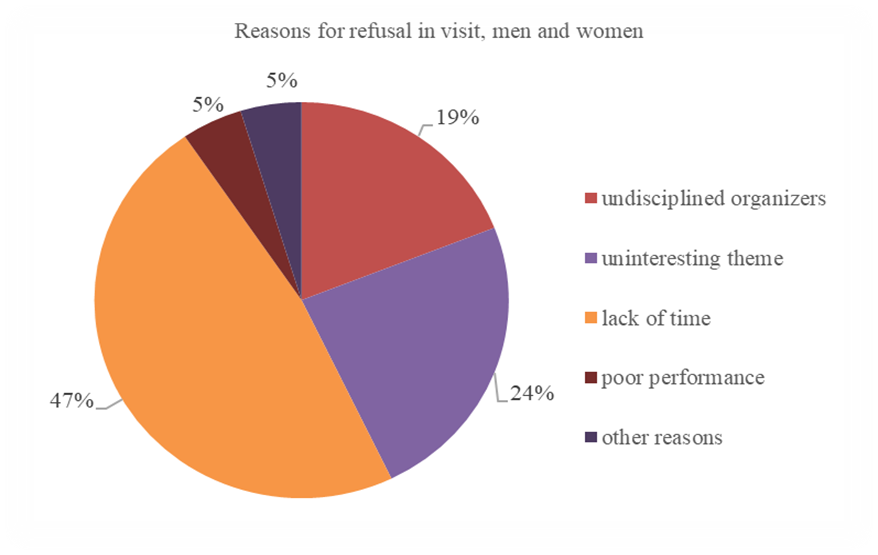
Those who prefer open space place higher demands on the level and quality of the events and on the accurate warning of their holding which is necessary when planning leisure and free time. Such visitors value their own time and draw their attention to the general picture of the event rather than to certain details.
In the process of studying gender differences, some specific psychological peculiarities of consumers influencing their choice and perception of the event were identified. These data can help to focus the organizers’ attention on adequate interaction with the audiences taking into account characteristics of their communication and personal activities.
The research has shown that men give their preference for open spaces. Before the event they carefully examine the programme of the event, assess its quality. Unlike women, in the process of communication men show no interest in insignificant details, their communication is focused on achieving the truth or proving their self-righteousness. In other words, men pay attention to the essence of communication, not to the form of presentation of the information. During the event they put greater emphasis on the overall picture disregarding details (52.3% men). Men are less involved in communication at the event: they discuss only issues they are interested in or they prefer moderate-intensity activity both as participants of interactive practices and in communicating with the speaker. More detailed information concerning the results on this subject can be found below (Figure 2):
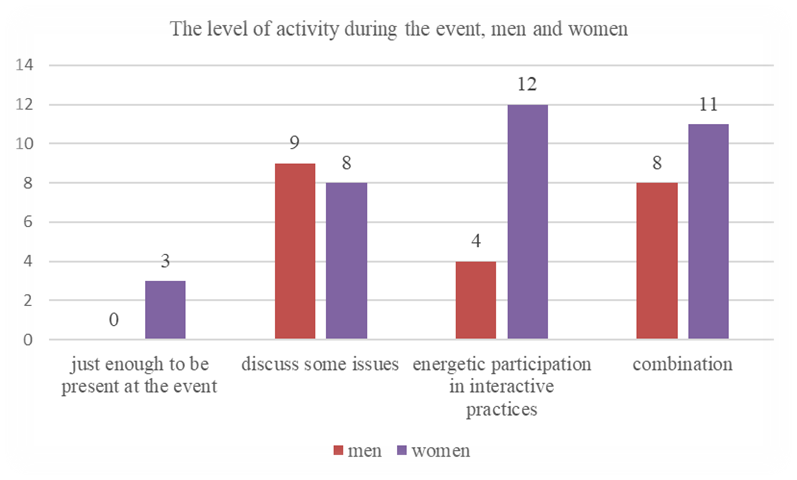
Male representatives attend the events since they wish to make their life brighter, to get new useful contacts and also to seek approval from the inner circle. Men attend different types of outputs: concerts, seminars, sporting events (there are no strong preferences). For men-respondents, their own time is an important argument when planning their pastime. Consequently, among root causes for missing the event were lack of discipline from organizers, namely, late warning of holding an event or non-availability of event reminders, etc.
In the transition to adulthood, men are taught by the society to hide or suppress their emotions. The study revealed that men seek to numb negative emotions, exhibit emotional indifference even in communication with men, since childhood are victims of discrediting by the society regarding the expression of emotions (Sultanova, 2008). It is known that suppression and avoidance put internal pressure on people impacts various spheres of their life. It also affects men’s perception of the events, distracts them from the promoted message and prevents consumption of marketing information. In a survey, men associate the events with their personal feelings they don’t pay attention to corporate identity of the company. Men respond weakly to marketing the product, their own advantage from the event is more important for them.
Women-respondents prefer indoor facilities for holding events (55.8% women compared to 38% men). In the process of socialization, the girl does not show any interest in increasing their status in social hierarchy. Women’s education aims to develop sensibility, understanding other people, responsiveness, unobtrusiveness, readiness to help. When communicating, the woman pays attention to the subject of interaction and focuses on the form pf presentation of information. The analysis of women’s attitude to the events showed that they devote much of their time to the details and overall programme of the event (50% and 44% women). The following diagram contains figures showing percentage of preferences for open/closed spaces and peculiarities of concentration and detailing on the event (Figure 3):
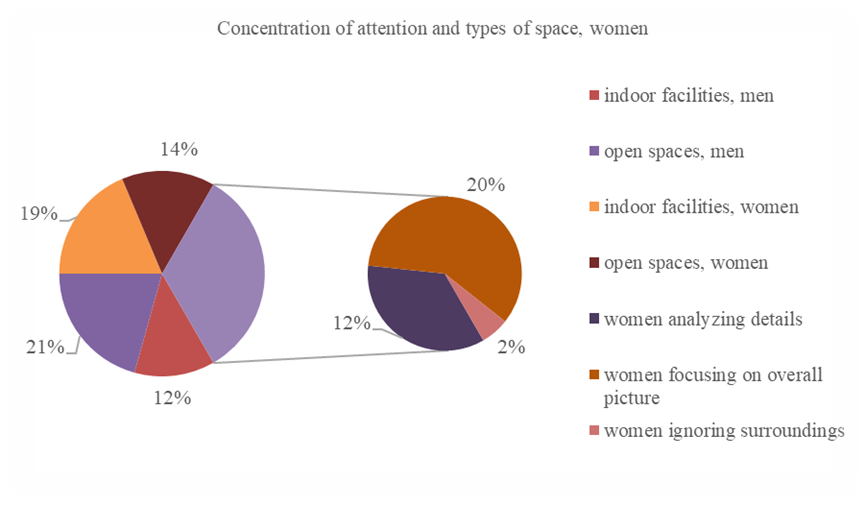
As compared to men, women are more actively involved in interactive events (35% women stand for active participation, 23% women reduce their participation to discussing certain issues). Due to their personal traits, when communicating women are more detail-oriented, they ask clarifying questions, shows interest in the event. In doing so, they try to reach agreement and understanding in communication.
Within women, there was a strong desire to attend events with the purpose to find brighter life and new social contacts (35% and 23% women). A diagram that shows the full stream of reasons for visiting events by women in comparison with men is represented in the following Figure 4:
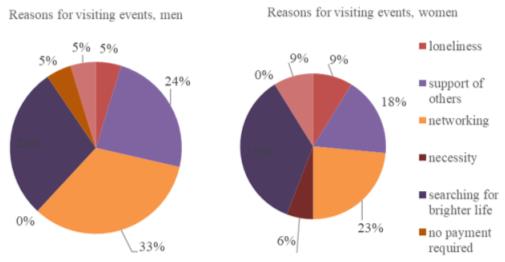
The interviewed women prefer the following types of the events: concerts (55,8% women), seminars and workshops (23% women). Examples of activities especially favoured by women-respondents are indicated in the Figure 5 below:
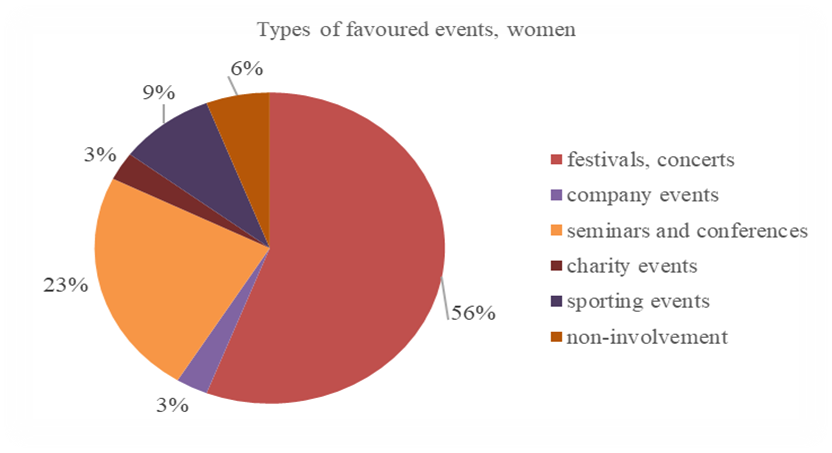
Women-respondents invest considerable efforts and resources to choose the event and are more interested in the event itself. If the subject of the event is uninteresting or they lack time to spare, such consumers won’t attend the event. The interviewed women associated corporate colours and colours of the event design with the event itself which might mean that the visitor to the event drew attention to the product and anchored it in mind. According to Heymans, women demonstrate extraordinary memory and attention only to what is of real interest to them. Analysis of the results of the research on gender inequality revealed the fact that men and women focus on different aspects of collaboration with the subject of interaction. Women are more productive when it comes to voluntary (non-concentrated, general) attention, at the same time they show high memorability in case they are interested in the subject of interaction.
Men demonstrate accuracy and detailed attention, work more actively and efficiently with the new incentives even if they are not one of their preferences or favourites. Men are concentrated on themselves as opposed to women who have advantage in ‘communicative attention’ (Bendas & Petrushihina, 2015).
For both men and women awareness of the events is of utmost importance. To organize effective pre-event support of the audience, it is necessary to understand which the best way to interact with them is. The study found that the preferred channels of communication with the audiences are the Internet and social networking sites (100% respondents) and rumour mill (47.3%). Distribution of the preferred channels of receiving information is shown in Figure 6.
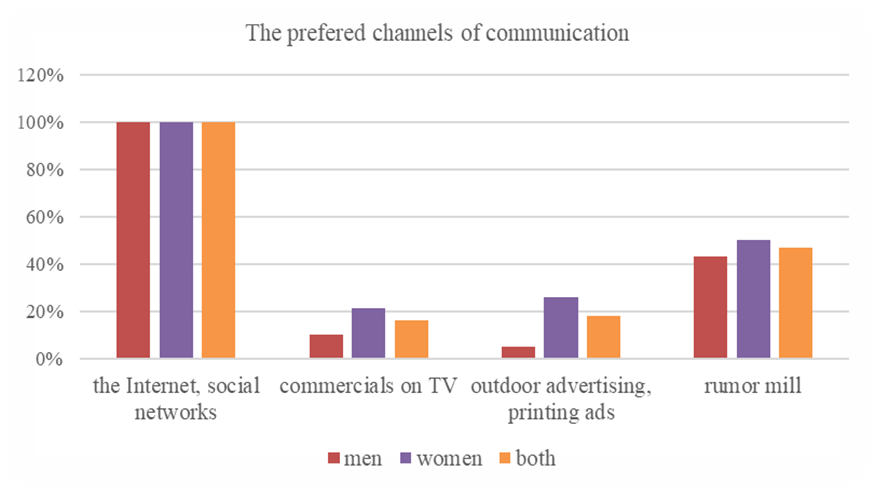
The male consumer who prefers the Internet as a site for receiving information draws particular attention to the functionalities and benefits of the product (event). This consumer is targeted at finding useful contacts, becoming familiar with the information required in his work/study. The female consumer considers the Internet as a tool for self-presentation, communication with other people. For women, emotional aspects of communication are significant; they choose the Internet to make their leisure more diverse and raise the level of motivation. The obtained data showed that the use of the Internet as a source of information leads to association of a certain colour with the event taking place. Results from a survey of respondents show the link between a particular colour and their personal feelings (52.4%), corporate colours (47.6%) and venue for the event (54.8%) (see Table 1).
A link is revealed between the preferred source of information and what a respondent benefits from the event. The Internet, social networks and rumor mill are in direct relation to what advantages respondents observe during the event: gaining new knowledge (62.3% respondents), obtaining useful experience and positive emotions (88.7%), making new acquaintances (60.4%). Further details concerning the results of the subject can be found in Table 2.
All these techniques of obtaining information are based on interaction with people and constant flow of information, that’s because attending the events respondents also tend to follow the patterns of awareness and put an emphasize on the opportunities which the Internet and social networks offer in small portions.
Conclusion
The study revealed peculiarities of perceiving marketing events by respondents. The subject of the study was examined from a gender perspective. We assumed that an important factor determining the attractiveness of the event and, therefore, its effectiveness is taking gender specificities of the targeted audiences into account. In organizing marketing events (either regional or local) the targeted audiences for which are women more emphasis should be put on the relevancy of the event topic to the pace and orientation of life of the audiences. It is important that the subject of the event should be crucial for women; effectively organized event gives them a sense of brighter life, helps make useful contacts and increases their communicative activity. Women pay attention to both the general programme of the event and the details, they expend a lot of resources on the event. Also, women are particularly involved in communication activities at the events. Women have been seeking to stand together for addressing emerging issues since childhood; that is why most of them prefer indoor facilities meant for holding events. Among the recommendations, the following ones may be identified: it is important to engage female audiences as much as possible in the event through the active discussion of interesting material accompanied by the presence at the event of the advertised product, corporate interior design, direct connection between the message of interest and the product.
In case the targeted audience is male, it is necessary to dwell on the basic message through words (men perceive verbal communication perfectly and conflict with non-verbal communication). Men are involved in the process of promoting a product with difficulty; unlike women, they don’t take marketing incentives in the form of corporate colours. For such visitor it is important to see the essence of the communication and its benefits for his life. In interacting with men, ‘pre-event support’ plays a significant role: for them, reminders of the coming event and mentioning the event’s benefits for his life are desired. When communicating, men are more efficient in addressing new challenges, and have trouble with situations which, from their point of view, are stereotyped and outdated. For that reason, it is advisable to focus on new advantages of the product while promoting it. In doing so, increased emotionality should be avoided; on the contrary, rational solution to the challenges is more preferable for men. They choose open ‘live’ spaces and areas; in this environment it is easy to stay with people and at the same time to be independent. Open spaces suggest a lot of room, such area is not limited by strong boundaries and creates illusion of freedom and relaxedness as well as possibility to leave the place, if necessary, which, according to the picture of characteristics of this gender, is so important for men.
References
Bendas, T. V., & Petrushihina, E. B. (2015). Problemy gendernoj psihologii liderstva: novyj etap razvitiya [Problems of Gender Psychology of Leadership: A New Stage of Development]. Psychology. Pedagogy. Education, 1, 134-142. [in Rus.].
Dolgova, I. V. (2018). Volzmozhnosti primeneniia marketinga vpechatleniy v prodvizhenii territoriy: teoreticheskiy i prakticheskiy aspekty [Possibilities of impression marketing in the promotion of the territory: theoretical and practical aspects]. Journal of economics, entrepreneurship and law, 8(2), 95-110. [in Rus.].
Dyachenko, A. V. (2013). Teatralizatsiya gostepriimstva [The Theatricalization of Hospitality]. Journal of service in Russia and abroad, 7, 27-35. [in Rus.].
Ekimova, V. I., & Filippova, S. A. (2008). Gendernye razlichiya: sociokul'turnyj aspekt [Gender differences: sociocultural aspect]. Siberian journal of psychology, 27, 64-66. [in Rus.].
Gabdreeva, G. Sh. (2016). Gendernye razlichiya adaptivnosti lichnosti [Gender differences in personality adaptability]. Philology and Culture, 1(43), 338-347. [in Rus.].
Golub, O., Timofeeva, T., & Serova, O. (2018). Analysis of the factors of forming customer loyalty: regional aspects. Proceedings of the International Scientific Conference "Competitive, Sustainable and Secure Development of the Regional Economy: Response to Global Challenges" (CSSDRE 2018). DOI:
Khavanova, N. V., Krivosheeva, T. M., & Osokin, V. M. (2014). Ispolzovanie instrumentariya marketinga vpechatlenij v industrii turizma [Using the experience marketing toolkit in the tourism industry] Journal of service in Russia and abroad, 3(50), 3-14. [in Rus.] DOI:
Klimova, T. B., & Vishnevskaya, E. V. (2014). Opyt razvitiya sobytijnogo turizma v RF i za rubezhom. Nauchnyj rezultat [Experience in the development of event tourism in the Russian Federation and abroad. Scientific result]. Journal of technologies of business and service, 1, 35-41. [in Rus.].
Lomovtseva, O. A., & Maslova, V. O. (2013). Marketing territorij: konceptual'nyj i prikladnoj aspekty [Territory marketing: conceptual and applied aspects]. Journal of Economics and Informatics, 27, 15-1(158), 15-24. [in Rus.].
Nistratov, A. A., & Sinyachkin, V. P. (2014). Gendernye razlichiya vospriyatiya tsennostey [Gender differences in the perception of values]. Questions of psychology journal, 22, 94-101. [in Rus.].
Novichkov, N. V. (2011). Marketing regionov: konkurentnyj podhod [Regional Marketing: A Competitive Approach]. ARS ADMINISTRANDI, 2, 5-12. [in Rus.].
Pologikh, A. A. (2016). Gendernye razlichiya v upravlenii i liderstve [Gender differences in management and leadership]. Leadership and Management Journal, 3(2), 73-86. [in Rus.].
Prokhorov, A. V. (2018). Sushchnost koncepcii marketinga vpechatlenij v sfere tovarov i uslug [The essence of the concept of marketing experiences in the field of goods and services]. Vestnik of Tambov university: Public sciences, 4(14), 51-56. [in Rus.].
Sultanova, A. V. (2008). Psihologicheskaya sovmestimost brachnyh partnerov [Psychological compatibility of marriage partners]. Vestnik of Saint Petersburg University: Sociology, 3, 76-84. [in Rus.].
Warren, C., Barsky, A., & Mcgraw, A. P. (2018). Humor, comedy, and consumer behavior. Journal of Consumer Research, 45(3), 529-552.
Copyright information

This work is licensed under a Creative Commons Attribution-NonCommercial-NoDerivatives 4.0 International License.
About this article
Publication Date
25 September 2021
Article Doi
eBook ISBN
978-1-80296-115-7
Publisher
European Publisher
Volume
116
Print ISBN (optional)
-
Edition Number
1st Edition
Pages
1-2895
Subjects
Economics, social trends, sustainability, modern society, behavioural sciences, education
Cite this article as:
Ursul, V., Timofeeva, T., Serova, O., & Polusmakova, N. (2021). Analysing Gender Specificities Of The Event Marketing Consumers. In I. V. Kovalev, A. A. Voroshilova, & A. S. Budagov (Eds.), Economic and Social Trends for Sustainability of Modern Society (ICEST-II 2021), vol 116. European Proceedings of Social and Behavioural Sciences (pp. 2184-2194). European Publisher. https://doi.org/10.15405/epsbs.2021.09.02.245

